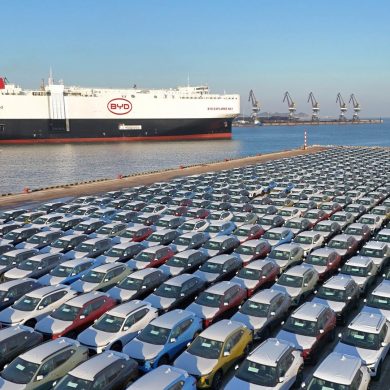The European Gigafactories for construction batteries of electric cars are just around the corner, constituting a golden investment opportunity for Greece with the electrification.
Producing batteries for electric cars in Europe reduces the carbon footprint of batteries, at least compared to "a value chain entirely controlled by China". In particular, a new analysis by Transport & Environment identifies the lowest carbon footprint with the current energy mix in the EU at 37% and 62% taking into account the increasing weight of renewables in production processes. In total, activating in Europe the production of cells and components needed to meet the demand for storage systems could save around 133 million tonnes of CO2 between 2024 and 2030.
Risks remain high
The analysis also shows some signs of improvement. Indeed, more than half of the lithium-ion battery projects announced in Europe are at risk, but in 2023 it was two-thirds: in one year, the number of projects that are not certain to be completed fell from 68% to 47%. In any case, 53% of projects are still at moderate to high risk of being delayed, reduced or cancelled altogether. In this respect, while France, Germany and Hungary recorded the most progress thanks to initiatives (Acc and Verkor in France, Northvolt in Germany), which in the previous analysis seemed to be at risk, in Italy the planned capacity was reduced to 48 GWh due to the failure of the ItalVolt initiative (Teverola and Termoli remain alive for the moment). 'The government should understand that batteries and the metals they are made from are the new gold,' says Carlo Tritto, policy manager at T&E Italy. 'Italy must play a leading role in Europe to create a framework that will guarantee real support for the transition in the coming years, for example by negotiating better financial instruments for gigafactories'.
The situation in Europe
Overall, Europe has the potential to become self-sufficient in cell production by 2026 and to meet 56% of descent demand by 2030. It could also meet all its needs for refined lithium and secure between 8% and 27% of its ores through recycling. However, it lacks the facilities and - most importantly - the financial support from the institutions.
An opportunity for Greece?
Although our country lacks expertise in the automotive industry, it potentially has all the prerequisites to host an electric car battery production plant, given the country's key position and the European regulations that govern it. The discussion is not only theoretical as the lignite power plant located in Kozani, when the production of the mineral is stopped, will be forced to change its purpose, saving jobs but at the same time giving the region the possibility of new investments that will develop the region of Western Macedonia.







